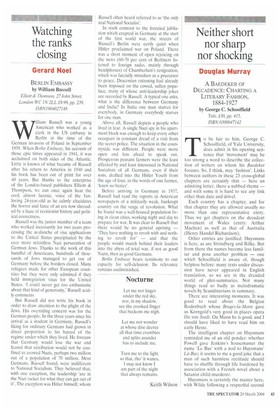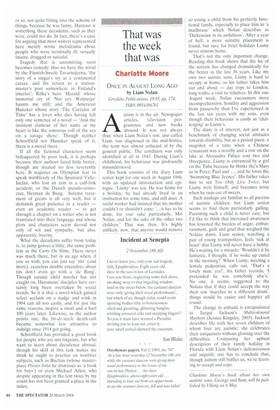Neither short nor sharp nor shocking
Douglas Murray
A BAEDEKER OF DECADENCE: CHARTING A LITERARY FASHION, 1884-1927 by George C. Schooitield Yale, £30, pp. 415, ISBN 0300047142 o be fair to him, George C. Schoolfield. of Yale University, does admit in his opening sentence that 'movement' may be too strong a word to describe the collection of writers on whom his Baedeker focuses. So. I think, may 'fashion'. Links between authors in these 23 cross-global chapters are certainly thin — here an admiring letter, there a nabbed theme — and with some it is hard to see any link other than date and drivel.
Each country has a chapter, and for that chapter they are allowed usually no more than one representative entry. Thus we get chapters on the decadent movement of Wales (entry: Arthur Machen) as well as that of Australia (Henry Handel Richardson).
Other entries are justified: Huysmans is here, as are Strindberg and Rilke. But from there the names become less familiar and pose another problem — one which Schoolfield is aware of, though helpless before: many texts under discussion have never appeared in English translation, so we are in the dreaded world of plot-summaries. Not many things read so badly as melodramatic novels by Scandinavians in summary.
There are interesting moments. It was good to read about the Belgian Rodenbach whose Bruges-la-Morte gave us Korngold's very good in places opera Die tote Stadt. On Mann he is good, and I should have liked to have read him on early Hesse.
The intelligent chapter on Huysmans reminded me of an old ponder: whether Powell gave Jenkins's housemaster the name `Le Bas' with a nod to Huysmans' La-Bas; it seems to me a good joke that a man of such harmless rectitude should have to shuffle through life burdened by association with a French novel about a Satanist child-murderer,
Huysmans is certainly the master here, with Wilde following a respectful second or so, not quite fitting into the scheme of things, because he was funny. Humour is something these decadents, such as they were, could not do. In fact, there's a case for arguing that most writers represented here merely wrote melodrama about people who were terminally ill, sexually insane, drugged or suicidal.
Tragedy that is unremitting soon becomes comedy: thus we have the novel by the Finnish-Swede Tavaststjerna, 'the story of a singer's try at a continental career, and his return to a stationmaster's post somewhere in Finland's interior'; Rilke's hero 'Harald' whose immortal cry of 'Not yet, Walpurga' haunts me still; and the American Huneker whose story 'The Corridor of Time' has a lover who dies having left only one sentence of a novel — 'And the insistent clamour of her name at my heart is like the sonorous roll of the sea on a savage shore'. Though neither Schoolfield nor Huneker speak of it, there is a moral there.
If all the fictional characters seem beleaguered by poor luck, it is perhaps because their authors fared little better, though are treated no less reverently here. It requires an Olympian feat to speak mirthlessly of the Spaniard ValleIncLan, who lost an arm in a cuff-link accident; or the Danish pseudo-aristocrat, Herman de Bang. Solemn treatment of greats is all very well, but it demands great patience in a reader — even an academic reader — to get through a chapter on a writer who is not translated into their language and whose plots and characters seem devoid not only of wit and sympathy, but also, apparently, brevity.
What the decadents suffer from today is, to jump genres a little, the same problem as the Carry On films. There never was much there, but in an age when, if you so wish, you can just say 'tits' (and more), ceaseless double entendres about tits don't even go with a `de Bang'. Though satanic child murder has not caught on, Huysmans' disciples have certainly long been overtaken by social trends. So it is that a novel which gained select acclaim on a nudge and wink in 1904 can all too easily, and for just the same reasons, inspire a snort and a hurl 100 years later. Likewise, as the author points out, the fin-dc-siècle death-cult became somewhat less attractive to indulge once 1914 got going.
Schoolfield has provided a good book for people who are not linguists, but who want to learn about decadence abroad, though his skill at this task makes me think he ought to practise on worthier subjects, such as Buchan (whose masterpiece Prester John he dismisses as 'a book for boys') or even Michael Arlen, who despite appearing in the text twice by my count has not been granted a place in the index.



















































































 Previous page
Previous page